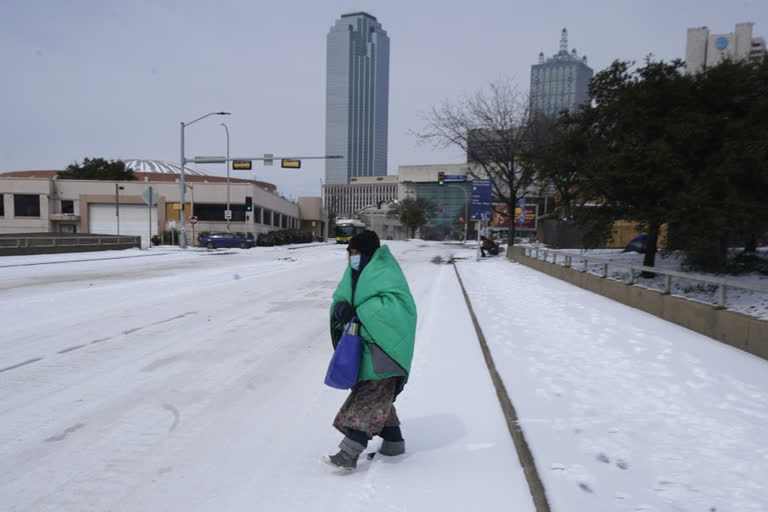Ocean Isle Beach: A winter storm that left millions without power in record-breaking cold weather claimed more lives, including three people found dead after a tornado hit a seaside town in North Carolina and four family members who perished in a Houston-area house fire while using a fireplace to stay warm.
The storm that overwhelmed power grids and immobilized the Southern Plains on Tuesday carried heavy snow and freezing rain into New England and the Deep South and left behind painfully low temperatures. Wind-chill warnings extended from Canada into Mexico.
In all, at least 20 deaths were reported. Other causes included car crashes and carbon monoxide poisoning. The weather also threatened to affect the nation’s COVID-19 vaccination effort. President Joe Biden’s administration said delays in vaccine shipments and deliveries were likely.
North Carolina’s Brunswick County had little notice of the dangerous weather, and a tornado warning was not issued until the storm was already on the ground.
The National Weather Service was “very surprised how rapidly this storm intensified ... and at the time of night when most people are at home and in bed, it creates a very dangerous situation,” Emergency Services Director Ed Conrow said.
Read:|Deaths reported as freezing cold grips southern US
In Chicago, a foot and a half (46 centimetres) of new snow forced public schools to cancel in-person classes for Tuesday. Hours earlier, along the normally balmy Gulf of Mexico, cross-country skier Sam Fagg hit fresh powder on the beach in Galveston, Texas.
The worst U.S. power outages were in Texas, affecting more than 2 million homes and businesses. More than 250,000 people also lost power across parts of Appalachia, and another 200,000 were without electricity following an ice storm in northwest Oregon, according to poweroutage.us, which tracks utility outage reports. Four million people lost power in Mexico.
Texas officials requested 60 generators from the Federal Emergency Management Agency and planned to prioritize hospitals and nursing homes. The state opened 35 shelters to more than 1,000 occupants, the agency said.
More than 500 people sought comfort at one Houston shelter. Mayor Sylvester Turner said other warming centres were closed because they lost power.
After losing power Monday, Natalie Harrell said she, her boyfriend and four kids sheltered at a Gallery Furniture store in Houston. The warming centre at the store provided people with food, water and power to charge essential electronics.
“It’s worse than a hurricane,” Harrell said. “I think we are going to be more days without light, that is what it seems like.”
Utilities from Minnesota to Texas implemented rolling blackouts to ease the burden on power grids straining to meet extreme demand for heat and electricity.
Blackouts lasting more than an hour began around dawn Tuesday for Oklahoma City and more than a dozen other communities, stopping electric-powered space heaters, furnaces and lights just as temperatures hovered around minus 8 degrees (minus 22 degrees Celsius).
Oklahoma Gas & Electric rescinded plans for more blackouts but urged users to set thermostats at 68 degrees Fahrenheit (20 degrees Celsius), avoid using major electric appliances and turn off lights or appliances, not in use.
However, Entergy began rolling blackouts Tuesday night in Arkansas, Louisiana, Mississippi and Southeast Texas at the direction of its grid manager, the Midcontinent Independent System Operator, “as a last resort and to prevent more extensive, prolonged power outages that could severely affect the reliability of the power grid,” according to a statement from the New Orleans-based utility.
“Due to extremely cold temperatures over the last several days, the electricity demand has reached an all-time high,” the Entergy statement said. “Additionally, these weather conditions have forced off generation resources across the system. The implementation of this load shed across the Entergy region will help ensure an adequate reserve margin, which helps ensure Entergy is better positioned to manage through additional extreme weather this week.”
